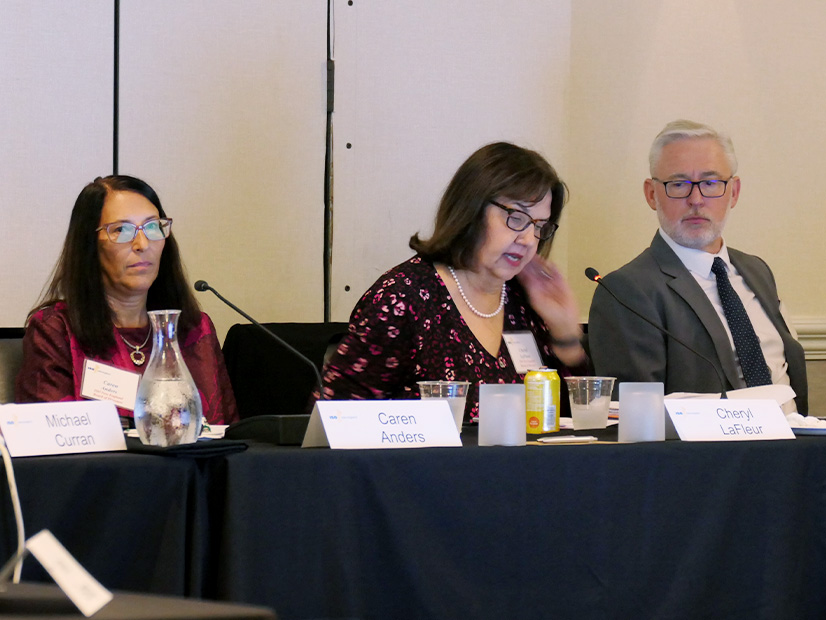
PROVIDENCE, R.I. — ISO-NE’s Board of Directors had the rare experience of staring public criticism in the face on Tuesday as the grid operator held its first open board meeting at a Renaissance Hotel in downtown Providence, R.I.
A series of speakers offering public comments came up one by one, addressed the board and told them what they think ISO-NE is doing wrong.
Most of the roughly 15 commenters were there to push ISO-NE to transition more quickly off fossil fuels and take the climate crisis seriously.
The meeting came about as part of a set of governance changes the grid operator is making to appease the New England states, which have been pushing for it to become more transparent and accessible. (See ISO-NE Offers up Governance Tweaks)
One of the most attention-grabbing comments came from Kendra Ford, a Unitarian Universalist minister from Exeter, N.H., who walked to the microphone and looked into the eyes of each of the board members before speaking.
“We are in an emergency, and you are not acting like this is an emergency. We have to rearrange and reorganize the way we think about everything. Energy is at the leading edge of that,” Ford told the board.
“You have done some things, but you need to do so much more, and you need to do it immediately to save lives,” she said.
Later, as the board continued its largely standard business with an update from ISO-NE CEO Gordon van Welie, Ford stood up again and cut in.
“You’re describing a carefully measured, convenient transition that doesn’t inconvenience anyone and doesn’t cause anyone to lose money. That can no longer be the way,” she said. “I am begging you to respond to the emergency. It may not be affecting you personally in this moment, but it is coming to all of us.”
Another commenter, Jonas Kaplan-Bucciarelli, a Boston University student from Amherst, Mass., asked the board to walk a mile in his shoes.
“I think that you don’t understand the level of urgency and despair around the climate crisis, especially that my generation is experiencing as we’re growing up in this world, and grew up having climate change on the radar as we were going through middle school and elementary school,” he said.
Many of the commenters spoke out against the region’s minimum offer price rule, which ISO-NE is phasing out instead of immediately removing, to the frustration of climate advocates in the region.
They also took ISO-NE to task for a stakeholder process that’s widely seen as the least accessible of any grid operator in the country.
“It’s been a struggle to engage with you all,” said Amanda Nash, an activist with No Coal No Gas and 350 Massachusetts.
“You are all well trained and paid to create and administrate these procedures, but for the vast majority of us, this is work we do on top of our jobs and other responsibilities,” Nash said. “It seems like obfuscation is the name of the game.”
ISO-NE COO Vamsi Chadalavada offered a response to the commenters later in the meeting.
“The passion and urgency that we heard is unmistakable,” he said. “But I also wanted to offer some comfort that that’s the same level of urgency that all of us at the ISO feel in making sure we get through the clean energy transition.”
“I didn’t want to leave you with an impression that we are pro-fossil. … We are equally motivated to move towards the future,” Chadalavada said.
And he urged people to reach out to the ISO for information and to answer questions, technical or otherwise.
At the meeting, van Welie gave a presentation on the organization’s strategic plan, and the grid operator’s managers also updated the board on market projects, energy adequacy and winter planning. And MIT Energy Initiative director Robert Armstrong gave a presentation to the board on the future of energy storage.


